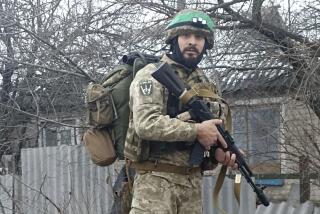800 Fighters Surrender in Colombia
- Share via
MEDELLIN, Colombia — In an elaborately staged ceremony that drew outrage from human rights groups, more than 800 paramilitary fighters laid down their arms here Tuesday in what the national government hoped would be the first step toward reaching a wider peace accord with their violent right-wing group.
Standing at attention in a downtown convention center, the ranks of camouflage-clad men and women bowed their heads in a moment of silence for the victims of Colombia’s four-decade civil war, which pits the government and paramilitary groups against left-wing guerrillas.
The fighters then listened to videotaped messages from three paramilitary leaders, two of whom have been accused of torture, murder and massacre, before turning their weapons over to the country’s top peace negotiator.
“The road to peace is open in Colombia,” declared Carlos Castano, the paramilitary fighters’ political chief, on the videotape. Castano, who is wanted in connection with several massacres in Colombia and has been indicted in the U.S. for drug trafficking, acknowledged that the group had committed “some excesses” but said its members were now seeking judicial pardons.
The ceremony -- which featured stirring music, finger-painting by displaced children and calls for peace from all sides -- angered human rights groups, which criticized the government for broadcasting the paramilitary speeches.
“The broadcast is a travesty,” Jose Miguel Vivanco, the Americas chief for Human Rights Watch, said in a statement. “Instead of handing these criminals a microphone, the government should be concentrating on arresting them and bringing them to justice.”
The controversy surrounding Tuesday’s surrender, the largest to date, is an indication of the rocky road ahead as the government seeks to reach a peace deal with the paramilitary forces, which have splintered into several factions totaling about 13,000 fighters.
In July, several top paramilitary commanders and the nation’s peace commissioner, Luis Carlos Restrepo, signed a communique committing the right-wing groups to demobilizing their troops by December 2005.
Since then, however, Castano and other leaders have insisted that they be granted amnesty for their crimes before entering formal negotiations.
But human rights groups and opposition leaders contend that murderers will be let off the hook if President Alvaro Uribe pushes through Congress a proposal allowing those who have committed “crimes against humanity” to pay fines rather than go to jail.
Another issue is drugs. Since their inception as private armies for the country’s drug lords and wealthy ranchers in the 1990s, the paramilitary forces have become increasingly involved in Colombia’s cocaine trade, which supplies about 90% of the drug sold on U.S. streets.
U.S. leaders have said that they would seek the extradition of paramilitary leaders charged with drug trafficking regardless of whether a peace pact was signed.
In addition, critics have charged that drug dealers were buying memberships in the private forces, hoping that peace talks would eventually result in an amnesty that would rid them of pending drug charges against them in Colombia.
There were also questions about whether the event Tuesday could stand as a model for future surrenders. The fighters who surrendered were from a paramilitary faction that operated in an urban setting in the hills surrounding Medellin, the country’s second-largest city.
As a result, they will have ready access to a government retraining program. They also do not face the same charges of massacres as their compatriots in the rural countryside.
The fighters will be transported to a small town outside Medellin where they will stay in government housing for three weeks to learn job skills in construction and carpentry before returning home. The U.S. has pledged to contribute toward a monthly subsidy of $525 for a year to assist their re-integration into civilian life.
“I think that [the process] has been rushed. There is no clarity, no strategy, no methodology” on the government’s part, said Luis Guillermo Pardo, a former peace negotiator.
Nor does Colombia’s history of peace negotiations offer much encouragement.
Many rebels who laid down their arms after peace negotiations in the early 1990s were killed by paramilitary fighters in the months that followed.
And talks with the country’s largest leftist rebel group, the Revolutionary Armed Forces of Colombia, failed in 2002.
Nonetheless, an air of hope reigned in the convention center Tuesday as the fighters received a final address from a political commander, a former law student known as “Comandante R.”
“Medellin, you deserve peace,” said the 37-year-old commander, whose real name is Giovanni Marin.
“We will comply! We will comply! We will comply!” the men and women shouted in response.
More to Read
Sign up for Essential California
The most important California stories and recommendations in your inbox every morning.
You may occasionally receive promotional content from the Los Angeles Times.










